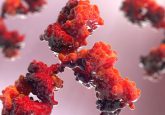Early FDG-PET adapted treatment improves outcome in stage I /II Hodgkin’s lymphoma

Results from the randomized intergroup European Organisation for Research and Treatment of Cancer, Lymphoma Study Association and Fondazione Italiana Linfomi H10 trial have demonstrated that early FDG-PET adapted treatment improves outcomes of early FDG-PET-positive patients with stage I/II Hodgkin’s lymphoma (HL).
John Raemaekers (Radboud University Medical Center Nijmegen and, The Netherlands), the principal study coordinator, commented, “Even though the prognosis for patients with stage I/II HL is excellent if they are treated with the standard regimen of chemotherapy combined with radiotherapy, tumor control could still be improved for specific subgroups of patients, and late toxicity could be reduced for others.”
He continued: “This trial, therefore, addressed two questions. First, can the outcome for early FDG-PET-positive patients with stages I/II HL be improved by administering early intensification of chemotherapy? Second, can involved-node radiotherapy be omitted from the standard combined modality treatment in early PET-negative patients?”
The trial was conducted at 158 sites in eight different countries: France, Italy, The Netherlands, Belgium, Denmark, Croatia, Slovakia and Switzerland. It involved 1950 patients aged 15–70 years with previously untreated stage I/II supradiaphragmatic classical HL.
The results, presented recently at the 13th International Conference on Malignant Lymphoma in Lugano (17–20 June 2015, Switzerland), showed that those patients with stage I/II HL who underwent two cycles of ABVD chemotherapy and were still FDG-PET positive significantly benefited with regard to progression-free survival from intensification to BEACOPPesc chemotherapy followed by involved-node radiotherapy, compared with patients who continued standard ABVD chemotherapy followed by involved-node radiotherapy.
The analysis of the early PET-negative group confirmed the conclusions reached in the previously published interim analysis. The authors were not able to demonstrate that treatment solely with chemotherapy was noninferior to the standard combined modality treatment with regard to progression-free survival.
Source: European Organisation for Research and Treatment of Cancer press release



